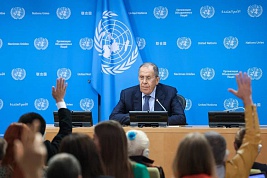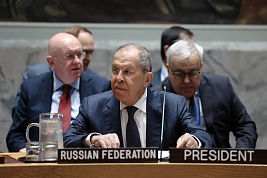Foreign Minister Sergey Lavrov’s remarks and answers to media questions at a joint news conference with Secretary-General of the Arab League Ahmed Aboul Gheit and Foreign Minister of Egypt Sameh Shoukry following talks, Moscow, April 4, 2022
Ladies and gentlemen,
I would like to thank our guests, representatives of the Arab League’s Contact Group that was established in connection with the situation in Ukraine.
We had a useful conversation. We described in detail the origins of the current situation that was brewing for many years due to the attempts of our Western neighbours to turn Ukraine into a real anti-Russia. President Vladimir Putin spoke about this in detail more than once.
Today, we went over the history and chronology of these events. Once again we explained in detail the goals of the military operation carried out in Ukraine at the decision of President Vladimir Putin. We answered our friends’ many questions, including those about prospects of settling the current situation, notably, the requirements for doing this and its influence on our bilateral relations and cooperation with the Arab world, the countries of the Middle East and North Africa.
These relations are influenced not by the situation as such but by the West’s absolutely unlawful unprecedented sanctions against Russia. They are dealing a heavy blow to the global economy, including countries that import agricultural produce, fertiliser and many other things that are directly linked with trade and investment ties that involve the Russian Federation.
We expressed our gratitude to the Arab League for the decisions it made in connection with and during the crisis in Ukraine, including at the plenary meeting of all Arab League members in the first half of March 2022. We expressed our willingness to cooperate and continue updating our colleagues on the developments and prospects of achieving the goals set.
We reviewed the situation in the Middle East and North Africa, paying special attention to the problem of Palestine that has remained unresolved for many years. We have a common position. We believe all final status issues, including Jerusalem, must be resolved only through direct negotiations between Palestinians and Israelis.
We appreciate the efforts of Egypt and some other members of the Arab League to unite the Palestinians and to restore their unity. We consider this a major challenge whose solution depends on the Arabs themselves.
We also spoke about the situation in Libya, Yemen and Syria. We expressed the hope that Syria will return to the Arab League very soon. This would enhance the position of our Arab friends all over the region.
I would like to thank Arab League representatives, Secretary-General of the Arab League Ahmed Aboul Gheit and Foreign Minister of Egypt Sameh Shoukry for their participation in this timely event.
Question: The West has been conducting a major campaign of disinformation and fake news during the special operation. The videos from Bucha are the latest episode in this respect. Why is Britain creating obstacles to the holding of a UN Security Council meeting on Bucha? How will Moscow react to any Western attempts to take unilateral steps outside international law? What is the proper mechanism for considering humanitarian issues in Ukraine based on facts and arguments rather than disinformation and fabrication?
Sergey Lavrov: As for the disinformation campaign (unfortunately, the episode in Bucha is not the last one but the latest chronologically), it now accompanies almost all conflicts. We have become used to it. We know how White Helmets operate in Syria. In response to the success of the government forces against the terrorists, the White Helmets had to be evacuated by their Western patrons. They persuaded Jordan to accept several hundreds of these people and promised to take them from there to Western countries – Germany, Canada and Britain within a couple of months. But in practice they did not take any of them when they became convinced that these people are real extremists working hand in hand with ISIS and other terrorist groups.
During the military operation in Ukraine, there have been many cases of fake information being injected. It is followed instantly by a propaganda campaign and angry condemnation. When the truth surfaces a few days later, nobody in the West wants to speak about it any longer. We will expose such fakes. In early March of this year, we exposed a situation that was presented as a tragedy at a maternity hospital in Mariupol.
As part of its reconfiguration of forces, the Russian military left the city of Bucha as early as on March 30 of this year. In the following three days, the Mayor of Bucha spoke on TV, describing how normal life was returning to the city. The Armed Forces of Ukraine came to the city. They showed streets with no corpses whatsoever. After three days, they probably decided to stage this “play.”
Let me recall that yesterday we tried to convene a meeting of the UN Security Council. Our British colleagues that preside in the Security Council refused. Our attempt today was also unsuccessful. They are saying that they themselves have planned the discussion of all aspects of the situation in Ukraine for tomorrow. Knowing British diplomacy, I can assume that they would like this specific piece of fake news to get lost in the demagogic discourse about the nature of the crisis in Ukraine. But regardless, our permanent mission in New York will organise a news conference where we will present a most detailed picture showing the true character of the events in the city of Bucha, which our Western colleagues are trying to present as evidence of war crimes committed by the Russian Federation.
We will insist that there be consequences for the crimes committed by the Ukrainian Armed Forces led by nationalist, neo-Nazi battalions.
We are working with our friends and colleagues to apply the relevant norms of international humanitarian law and to support these accusations with clear-cut, irrefutable facts. This is exactly what we will be doing, unlike the fabricators.
Question: You mentioned the other day that there was some forward movement at the Russia-Ukraine talks on Ukraine’s neutral status. Considering the new circumstances, what are the chances for achieving a peaceful settlement of the conflict and reaching agreements which would then be submitted for adoption by the two presidents during their summit meeting?
Sergey Lavrov: The round of talks which took place on March 29, 2022, in Istanbul showed us that the Ukrainian delegation’s position was becoming more realistic on matters dealing with ensuring Ukraine’s security. Kiev representatives realised that they would not receive security guarantees within NATO so they should forget about joining the Alliance. There was also more realism on their behalf in terms of stipulating Ukraine’s neutral status in the agreement, as well as declaring it a non-nuclear state, considering how the Ukrainian leadership has been flirting with this topic in the past months.
In terms of its positioning, the Ukrainian delegation appears to be much more receptive on the status of Crimea, and the Donetsk and Lugansk people’s republics. We have yet to find a way to translate these undertones into binding commitments. Contacts continue via videoconference, and the delegations are quite proactive in their efforts, at least as far as the Russian side is concerned.
As for your question on whether a peaceful settlement stands a chance, there is always a chance, as I have been saying all along. We are committed to ensuring that they materialise. President of Russia Vladimir Putin articulated the goals of our operation. We are working to set them forth in a treaty which is currently being discussed and drafted. I hope that eventually its final version will contain all these provisions.
Vladimir Putin has said many times that the summit between the presidents of Russia and Ukraine can take place when there is an outcome for which it would be worth convening this meeting.
Question: How do Russia-Ukraine talks affect the Russian operation in Ukraine?
Sergey Lavrov: The talks do not affect the progress of the operation. The outside actors do. They are trying to undermine these talks to ensure that there is no end to hostilities on the ground. We know where our Ukrainian neighbours are getting this kind of advice. The rationale underpinning these goals is flawed and has nothing to do with the interests of the Ukrainian people, Ukraine’s security or security in the OSCE region and in our European region.
I do hope that those heading Kiev’s delegation at the talks will be guided by their own national interests and the interests of their people instead of listening to far-away advisers. There are times when all these advisers want is to see the crisis escalate.
Question: US President Joe Biden called President of Russia Vladimir Putin a “war criminal” and called on prosecuting him for war crimes. What does this say in terms of Russia’s international reputation?
Sergey Lavrov: Primarily, this speaks to the fact that many American politicians have a guilty conscience. They caused the war in Iraq under far-fetched pretexts, destroyed Libya together with their NATO partners and invaded Syria. I think that you have also heard how members of the Joe Biden administration commented on these statements. They said that this was not what he meant to say.
Just like with any topic, what matters to us is the way the Russian people view this situation, whether the people understand the goals set before our Armed Forces. It is essential that people understand that this is not about Ukraine but about the fact that the collective West definitively came together under Washington’s umbrella and swore its full fealty to the US, which brought about the very unipolar world order model that Washington wanted to preserve by hook or by crook (mostly crook).
In this unipolar world order, the sovereign ruler can do as he pleases, while others do not even dare raise the question of ensuring their own security. This sovereign ruler created a situation along our borders and the borders of its competitors requiring a response, which can become harsh at times.
Over all these years, the West showed no inclination to discuss anything dealing with the calls to honour its commitments on indivisible security. This hubris swept across all possible levels and will bring trouble. This does not serve the interests of any nations around the world, including the Western countries.
We are ready for an honest conversation. But it must be honest. Our partners use a stacked deck – we are used to this. This is not serious. This is the usual game of assigning blame and reaffirming one’s own grandeur.


